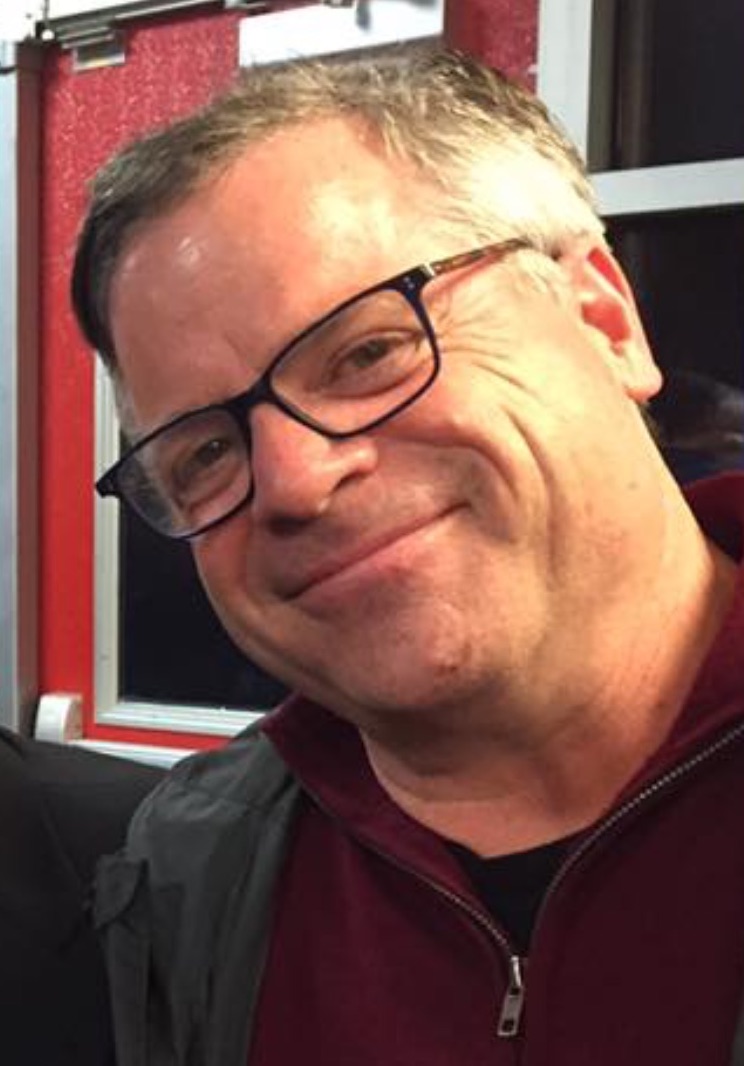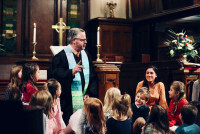6 min read
Union alum the Rev. Greg Horn ’91 is the Senior Pastor at The Presbyterian Church of Upper Montclair, an adjunct faculty member at Union Theological Seminary and Auburn Theological Seminary’s counselor to Presbyterian students at Union. In this interview, Union and Auburn teams joined together to speak with Rev. Horn about his time at Union, his commitments to social justice, and his reflections on the future of ministry.
Thank you so much for taking the time to speak with us today. To start, can you tell us a bit about who you are and the work that you are engaged in?
 I’m Greg Horn, I’m a 1991 alumnus of Union, Presbyterian minister, and a pastor. I was ordained right after I graduated, so it’s coming up on 32 years. I’ve been a pastor in four congregations and when I was a student at Union I was a pastoral intern at a couple of different churches in Manhattan as well as in Montclair, New Jersey. I’ve been in my current congregation in Montclair for almost 14 years.
I’m Greg Horn, I’m a 1991 alumnus of Union, Presbyterian minister, and a pastor. I was ordained right after I graduated, so it’s coming up on 32 years. I’ve been a pastor in four congregations and when I was a student at Union I was a pastoral intern at a couple of different churches in Manhattan as well as in Montclair, New Jersey. I’ve been in my current congregation in Montclair for almost 14 years.
I also did for a time what we call in the Presbyterian world a “validated ministry” as the director of a homeless program for people with HIV/AIDS in the Bronx, Brooklyn, and Manhattan. After that I decided to go back into the parish, and then a couple of years after that I was asked by Auburn to be the staff person dedicated to supporting their Presbyterian Students Program. I’ve been in this position since 2005, and since 2006 I’ve been teaching a couple of classes through Union with Auburn support to help Presbyterian students prepare for ordination exams and vocation in ministry.
Is there an experience that you’ve had recently that reminded you of the value of having a Presbyterian counselor at Union?
The most recent experience I’ve had was about a week and a half ago with a woman who graduated in 2020, just as COVID hit. She called about a difficult situation she was facing at her church and I talked through what was going on, what it means for her personally and vocationally, letting her know that it’s not unusual, and most importantly letting her know that I’m here, I care, we recognize her many gifts. That kind of thing is really important—to be trusted enough to be invited into students’ stories all along their journeys as they grow and develop. I still have these problem-solving and check-in conversations with our graduates all over the country, and I’m grateful for that.
Why is it important to you that you’re working at the intersection of faith and social justice? How does your faith inform your justice work, and how does your justice work inform your faith?
To me it’s about an encounter with God, a personal transformation—and that’s essentially symbiotically linked with justice issues and ministry. I think that one without the other is inauthentic.
The Auburn-Union Presbyterians are amazing people who are responding to something happening in their hearts and in their lives—answering a call, dare I say. It’s a real privilege to be alongside them while they are doing that. Almost all of us who went to Union care very much about issues of justice and valuing every human being with as much, if not more, love and value than that we need or want for ourselves.
I went to Union in part because that’s where my commitments have always been—with homeless folks, neighbors, people who are food insecure. I don’t come from a super privileged background myself, so I’m comfortable in a lot of different settings. I’ve found that when people are exposed to other human beings, especially marginalized folks who are suffering, it creates something inside of them that directly contributes to material changes in the world around them and their long term commitments. So I try to provide opportunities for that to happen.
I look at it from a congregational point of view. As a pastor, you build up advocates when you provide experiences for the spirit to let loose. My congregation has always been really committed to social justice, we are very committed to Newark and New York City. When we’re delivering services and having conversations we’re being transformed, as well—sometimes without us even knowing it. And to me, that’s where the hope lies.
Can you share a bit more about your time at Union? What was your time at Union like, and are there any particular classes or professors that really stand out to you?
I wasn’t particularly church-y growing up, partly because as a military pilot’s family we never lived anywhere long enough to join, and also because I was sort of a sarcastic, skeptical young person and interested in doing other things. But I had always learned from my mother this idea of helping where you can, and I always felt like myself when I was with people living tough lives.
I discovered Union in 1987 while on a New York City bus reading Dietrich Bonhoeffer—I saw “Union Seminary” in the footnotes and started to consider Union as an alternative to Princeton Seminary, where I had thought I wanted to attend. When I visited a few months later, I went to a chapel service. The Black Lesbian Caucus was leading worship, and I was like, “You know, I think I need to be here. I need to be in a place where God is at work in ways that I really want to discover and learn more about.”
At Union I felt like I was “coming home,” to quote John Denver, to a place I’d never been before—the diversity of students and the opportunity to do ministry in New York City. I fell in love with New York, and I immediately felt like I belonged at Union and in ministry. All of my categories of understanding exploded. And the professors—it’s hard not to mention Raymond Brown, and Phyllis Trible who was my thesis advisor. Christopher Morse, James Washington, Ann Ulanov, Robert Seaver—I could go on and on. And of course my fellow students.
Tell us a little bit about your work with Auburn. How does this relationship inspire you to live out your own call to faith and justice?
I feel very privileged to be a part of what Auburn is doing and to have watched really since the late eighties, how Auburn has journeyed, evolved, and changed. I’m very excited about our new president, Dr. Emma Jordan-Simpson, our current leadership, and its commitment to support the Presbyterian program and also Union. I love Union. I want it to survive and thrive and always be a place that people who think and feel for themselves can find their way. I’m deeply convinced that if more Presbyterians knew about the Auburn-Union connection, more would come.
Part of what I do is play devil’s advocate with these students who show up with very certain ideas about the church, unfortunately oftentimes well-earned negative ideas, and to be with them as they re-discover their tradition on their own terms. That is really exciting to see.
Union Presbyterians tend to be very significant people in the Union Community. In the sense that I am a small part of Auburn’s and Union’s people who are committed to justice—I am incredibly privileged.
How does the mentorship process work?
I come to Union on Thursdays and meet with students and teach class. I also administer certain denomination and ordination related exams. There is a pastoral relationship that is developed over the years. We also have a joint relationship with New York Theological Seminary, and there are a lot of Presbyterians there, and we mix them together. With all of the relationships that I build, I look at them as continuing forward.

What do you hope for the future of pastoring your faith tradition or with the world at large?
What’s going on in the church and in pastoral leadership is reflective of what’s going on in the world. There are fewer and fewer opportunities for pastoral leaders. The diminishment in numbers in the mainline churches is sad in a lot of ways for me. A lot of congregations these days can’t afford a full-time clergy person. One of the things you really detect is anxiety about the future of this as a profession, questions of “how can I make a living?”
Yet it is also interesting that when there are fewer people in the pews, in one way it’s not good, and on the other hand there’s more of an authenticity to it—the people who are there want to be there. They are swimming against the societal and cultural current in a way that is admirable. And that’s also true for those in pastoral leadership, as well as those in other human services, justice work, social work professions—people who make those choices tend to be doing it for reasons that are more intrinsic to who they are and who they feel called to be. And that is a gift.
What would your advice be to young people who are curious about what you do and might want to follow in working at the intersections of faith and social justice?
As Frederick Buechner said, “The place God calls you to is the place where your deep gladness and the world’s deep hunger meet.” Where can you have that fit?
It’s a deeper kind of thing than a job. Not that jobs don’t entail passion and maybe even more so in some cases. But for the most part, don’t settle, trust that instinct, be happy in the deepest sense. The way I would translate that is based on one verse that’s really important to me in the New Testament, John 10:10—Jesus said, “I came that they might have life and have it abundantly.”
What is it that makes a person most alive? As one of my favorite authors, Sister Karol Jackowsi, says, consider being a nun—not that you would, necessarily, but ask yourself why would you do something like that? What would it be for or about? It would be to find your best self. It is your abundant life. Wait for the moment when you feel it, and then do whatever you have to do to pursue it and bring it into a full circle. Don’t settle for anything but being your true self, your best self, living your abundant life.
Is there anything else that you would like to share?
A multi-faith place like Union, or a place like Auburn with the kind of commitments it has, really lends itself to people connecting or re-connecting with their traditions and with the possibility of reconciliation. This presence, this love, which reaches out of its own accord, transcends differences and boundaries in a way that makes relationships across differences possible. This is one of the sources of hope in the midst of everything.
